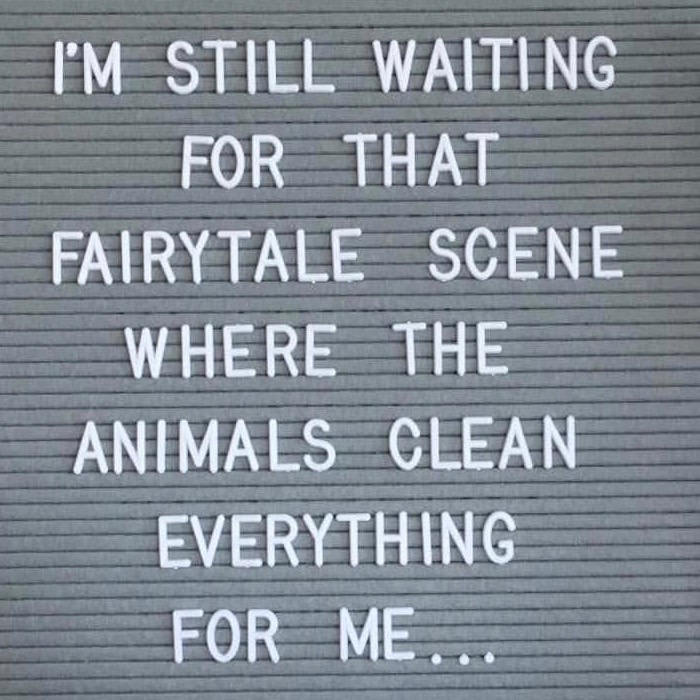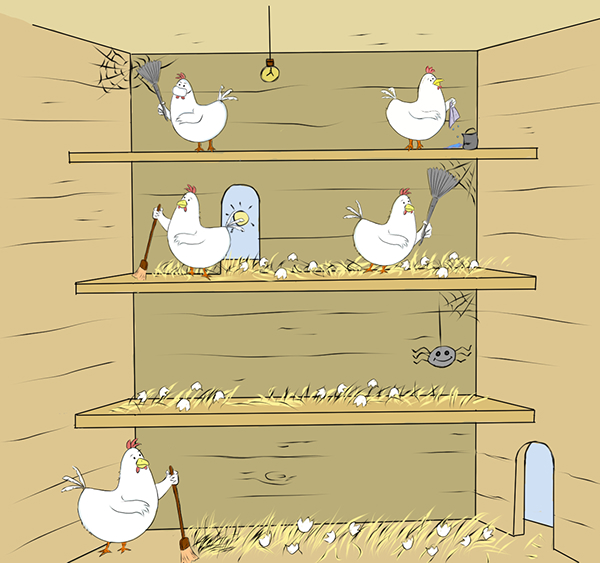What can I possibly write about cleaning a coop? It seems like a no-brainer, but I think we all have different ideas about what is, and how to, clean.
When surfing through memes about cleaning i found they fall into two distinct camps: a messy house is synonymous with a creative mind or someone who has more important things to do than mundane, repetitive chores; and a clean house is reflective of an uncluttered, tranquil mind owned by a person of higher virtues. What might work for people doesn’t always for chickens.
Coop cleaning is not so much about aesthetics (which shouldn’t be underrated), but about hygiene and minimizing disease transmission. Bottom line: good housekeeping is the fundamental building block to keeping your flock healthy and disease free.

I’ve visited plenty of chicken keepers and have seen a wide array of set-ups and housing. I’ve also observed that folks have quite different attitudes about what is acceptable in terms of cleanliness. Some people have lots of time and dedication and clean daily, while others allow their coops to get to the point where there is significant manure build-up before shoveling it all out.
Folks love the idea of keeping chickens, but until you get them you can’t imagine how much cleaning is required. Let’s face it, chickens are dirty: they poop whenever, wherever – on the roost bars, in the nest boxes, on their feeders and in their waterers. They dip their dirty beaks into communal water. They dust bathe and shake, spreading clouds of fine dust everywhere.
If you don’t like housework you probably shouldn’t get chickens. I’m not keen on housework either, but actually spend more time managing dirt in my coop than cleaning my own house. Would I rather be doing something else? Sure, but I do so because I want to promote good health for my flock. In the long run it pays off by having more robust birds with fewer health issues.
Bedding
Some folks use the deep litter method: a practice of managing chicken waste by allowing their droppings and bedding material to compost inside the chicken coop instead of being cleaned out and replaced regularly. I tried it, and must confess that it didn’t work for me. I live in a temperate rainforest and the shavings got wet and smelly and when I removed them a month or so later it was a significant amount of heavy work. I prefer to change their bedding weekly so I can ensure it’s clean and the workload is manageable. That said, I’m able to get shavings for free from a number of woodworkers on island, so cost is not an issue. I compost the old bedding in the woods in areas where I am building new habitat for mushrooms. Using a long-handled lightweight shovel will save your back.
Throughout the summer and fall I collect a number of herbs and flowers, many of which are considered insecticidal or antifungal: rosemary, mints, calendula, chamomile, nasturtium, marigold, lavender, fennel seeds, oregano and lemon balm. I cut them into fine pieces, dry and add them to the nest boxes. Some folks make cleaning sprays as a way to freshen and disinfect their coops.

Water Containers
Nipple-style waterers are recommended as they are less likely to spread pathogens from fecal contamination. I’ve been slow to adopt that style. I do have two that are in use, but also have the conventional plastic type. When I first had chickens I used a galvanized water container which I found too large and heavy. If you add apple cider vinegar to their water you can’t put it in metal container as it promotes rust. The plastic ones are a manageable size, but the grooves are a place for algae to grow and it is hard to remove. It’s important to really scrub in order to fully remove algae, biofilm, dirt and poop. I tried putting them in my dishwasher and found that everything just got baked on. Nothing beats old fashioned elbow grease. In the summer, I fill a bucket with hot soapy water and clean them outside; in the winter, I wash and disinfect them in my kitchen sink.
Feeders
I have DIY feeders made from PVC pipes. They stay relatively clean throughout the year. When I do my deep cleaning I remove and thoroughly hose them out, allowing them to air dry before reinstalling and adding fresh pellets.
If I use metal bowls in the infirmary or brooder I put them in the dishwasher to disinfect them.

Types of Cleaning
I think we all have different notions of what we would consider clean. I’ve seen some pretty poopy coops and algae infested water containers to know that. There are three levels of cleaning, each employed for different tasks:
Dry cleaning: removal of poop and dirt, which should be considered preliminary cleaning, as it only removes what we can see. There are still microscopic pathogens harboured in the residue left behind.
Wet cleaning: using soap and water on water and feed containers, wiping down surfaces within the coop.
Disinfection requires the use of products like Virkon spray or 29% Hydrogen Peroxide, which are designed to kill pathogens. I’m fortunate in that my main coop floor and foundation is made of concrete. I can sweep, shovel or hose the bedding out and then spray the floor before adding new bedding. Unfortunately we can’t disinfect the soil, where lots of pathogens live, but we can try to eliminate them within the coop.
I love hanging my laundry outside whenever possible. There is nothing like sunlight and fresh air to make your clothes smell great, but they also act as disinfectants. Make sure your coop has plenty of opening windows for both ventilation and daylight.
I commute off-island four days a week and am away from home 10 hours a day. Depending on the season, I do my chicken chores (filling water and feed containers, scooping poop) for a few minutes both before, and after, work every day. I spend significantly more time with my birds on my three days off and on my holidays (i.e. staycations as I never take holidays). So what does that mean?
Daily (15- 20 minutes)
- Rinse out water containers and replenish with fresh water
- Scoop poop from the droppings board and from the shavings on the coop floor
- If there are young birds that roost in the nest boxes, I scoop their poop and add new bedding
Weekly (1+ hour)
- Thoroughly clean all water containers
- Shovel out bedding and dispose of in the woods where my birds don’t have access to it (in case there are internal parasite eggs or mites in them).
- Add new shavings to the coop and top up what’s in the nest boxes
- If there are broody hens with chicks, clean out their dog crates and waterers
Monthly (1 hour)
- Organize feed bins and equipment in the coop and shed
- Hose out crates that have gotten dusty in storage
- General clean up – declutter what I don’t need
Three Times/Year Deep Cleaning (3.5 hours)
- Remove everything that is not attached in both sides of the coop (main sleeping quarters and the area that houses supplies/infirmary/broody hens).
- Shovel out all bedding on the floor and in the nest boxes (dispose of outside my pen)
- Sweep ceiling and walls of cobwebs and dust
- Hose or power wash walls, roost bars, nest boxes and concrete floor
- Clean windows
- Remove dust from all items returning to the coop
- Disinfect floor

Just like housework, coop cleaning isn’t a lot of fun. It is, however, essential to the good health of your flock and something we have to do whether we like it, or not. I use it as an opportunity to spend time with my birds, notice anything that might be amiss, get to know them as individuals and just enjoy being with them. There is nothing like the feeling of a clean house, even if you know it won’t be long before it gets messy again.

Featured image and cartoon chickens courtesy of Ensieh Tahani.









This is the best info on one page since I have had chickens!
LikeLiked by 1 person
Thanks for sharing your routine with us. This is great advice!
In my case, a super clean house is a sign of how upset I was before I drained my energy getting things spotless. When I was younger and I got mad, my mom would tell me to do something productive. Not sure why, but for me that meant cleaning.
LikeLiked by 1 person